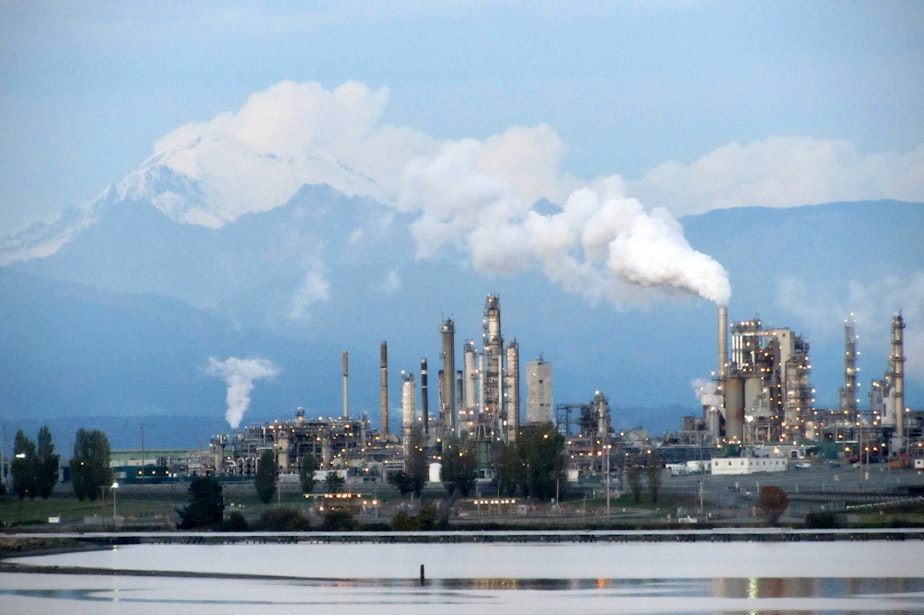Democrats in Olympia undeterred by anger from Oregon, Idaho and Alaska over targeted fuel tax

Majority Democrats in the Washington Legislature on Tuesday narrowly beat back a third attempt to squelch a new tax they proposed on gasoline and diesel exported to neighboring states from Washington refineries.
The 6 cents per gallon tax would support a multibillion dollar transportation infrastructure package. The tax proposal has stoked bipartisan anger and threats of retaliation in recent days from politicians in Oregon, Idaho and Alaska. Drivers there would pay more at the pump, but can’t vote on the Washington state lawmakers who seem determined to impose the “exported fuel tax” to pay for projects back home.
After a spirited debate, the Washington House Transportation Committee voted 15-14 to keep the fuel tax in the larger revenue and spending blueprint. Last week, Republican state Senators similarly tried to strip out the new tax, first in committee and then on the Senate floor, and failed on party line votes.
"If we move pieces around in this package before it gets its full process, it will be out of balance,” said House Transportation Committee Vice Chair Sharon Wylie, a Democrat, while urging her colleagues to stay the course.
Arguing for the Republican minority, state Rep. Eric Robertson said the offending export fuel tax could be easily replaced by shifting around existing sales tax revenue.
Sponsored
“We certainly don’t want to get into a trade war or lengthy litigation that would otherwise diminish our ability to move forward with a transportation plan,” Robertson said.
Most of the motor vehicle fuel consumed in the Pacific Northwest comes from five oil refineries along Puget Sound. Oregon is particularly dependent on its northern neighbor as it has no refinery within its borders. According to the U.S Energy Information Administration, more than 90 percent of the gasoline and diesel Oregon drivers use comes from Washington state.
Legislative staff in Olympia estimated the new export fuel tax would bring in around $2 billion over the next 16 years, with the lion’s share of that coming from levies on gasoline and diesel delivered to Oregon. A smaller share based on smaller volumes of deliveries would be borne by consumers in Idaho and Alaska.
The new tax on other states’ fuel consumption allows Washington state lawmakers to crow about how they were able to avoid a gas tax hike for their constituents, which is historically how major new state highway and ferry construction projects were financed. The total $16.8 billion revenue and spending blueprint encompasses other big components including $2 billion from the state operating budget surplus, a sizable chunk of federal infrastructure money and future carbon emissions fees, including on Washington’s five major refineries.
The governors of Oregon, Idaho and Alaska have all lobbed sharply worded protests toward Olympia over the export fuel tax. Oregon Gov. Kate Brown said she called fellow Democrat Washington Gov. Jay Inslee last Thursday to say the proposal was unreasonable and unacceptable.
Sponsored
“Oregonians will not stand for a gas tax levied by Washington with no consultation with our state, business community, or residents,” Brown said in a follow up tweet and op-ed on Monday.
Republican Idaho Gov. Brad Little and his state’s attorney general fired off a joint letter to Inslee on Friday in which they asked the Washington governor to veto the export fuel tax if it reaches his desk. Inslee has praised the thrust of the overall transportation package, but the idea for the export fuel tax did not come from him.
In Juneau, GOP state Rep. Kevin McCabe described several ways Alaska could retaliate by targeting the Puget Sound-based fishing fleet that fishes seasonally in Alaskan waters. One option McCabe floated was adding a 6 cents per pound tax to every fish caught by a boat owned by out-of-staters. Another option could be to impose a 6 cents per foot tax on non-resident fishing boats when they moor or anchor in Alaska harbors to load or unload fish.
“Frankly, I’m tired of being thought of as a Washington colony,” McCabe fumed in a floor speech Thursday. “I’m tired of them depending on us and taxing us for their needs and ignoring ours.”
Republican lawmakers within Washington state and the aggrieved parties who use exported fuel in neighboring states both assert the proposed fuel tax runs afoul of the U.S. Constitution’s protections for interstate commerce.
Sponsored
The single biggest highway construction project ticketed for funding in the proposed new transportation package is $1 billion for Washington's share of the cost to replace the old and seismically-vulnerable Interstate 5 bridges over the Columbia River between Portland and Vancouver. The spending blueprint also includes a contribution toward a better bridge over the Columbia at Hood River, Oregon. The package also pays for four new hybrid-electric car ferries, numerous bike trails, high speed rail, expanded freeways and transit improvements.
Two Southwest Washington Democrats who represent many cross-border commuters, Vancouver state Sen. Annette Cleveland and Rep. Sharon Wylie, introduced successful amendments last week and on Tuesday respectively, to delay the effective date of the new export fuel tax to midsummer 2023. They said the five month delay would buy time for unspecified “talks” where the tax could be a bargaining chip to find alternative solutions.
“We’ll have plenty of time to address unintended consequences and be fair to our partners,” Wylie said Tuesday about the merit of pushing the implementation date past the end of the 2023 legislative session.
The underlying transportation revenue and spending package, dubbed by its sponsors as Move Ahead WA, is moving ahead briskly through the legislative machinery in Olympia. The next step is debate by the full state House of Representatives. The 2022 session of the Washington Legislature is scheduled to adjourn in slightly over two weeks on March 10.
Copyright 2022 Northwest News Network




